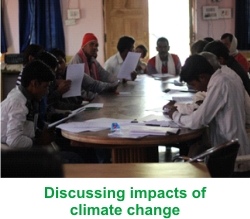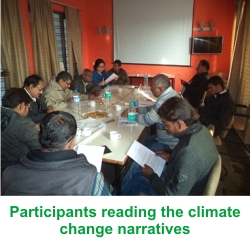|
Climate Change Narratives
by Over the last few years, discussions on climate change in many global, national and state level summits and conferences have mostly been around what the experts understand and believe. Understanding of climate change from communities’ angles and perspectives has been somewhat limited. Climate Outreach, CANSA and other civil society organisations like Development Alternatives have done a collaborative research on the topic and tried to create an understanding about climate change through the narrative of climate affected communities in rural Bundelkhand in Central India. The drought prone Bundelkhand region comprising of 13 districts in Madhya Pradesh and Uttar Pradesh is one of the most climate vulnerable areas in India. The participants in the two workshops were mostly farmers and all were men of varied age groups and low levels of education. The sessions were conducted in Hindi.
Methodology and Approach adopted for the Community-led Narrative
Research
The research approach followed was participatory. It allowed the two groups of participants to talk about climate change impacts according to their understanding and what they had witnessed in their own lives, not on the basis of complex and abstract science regarding climate change. The process gave emphasis on exploring the participants' own values, concerns and aspirations rather than a particular policy proposal or technological response to climate change. The narrative workshops followed a script which was developed by Climate Outreach. The script began with getting the participants to talk about their values and attitudes based on a series of questions around personal, national identity and concerns regarding the future. Discussions on climate change and renewables came later. Following are different parts of the script: • Values - What do you care about? What do you like and dislike? What makes you proud of who you are as an individual? • National identity - How do you feel about India and your place in it? • Changes - What changes have you noticed and what concerns do you have for the future? • Climate change - What does climate change mean to you and what do you think causes it? • Climate change impacts - Have you witnessed any impacts related to climate change in your life? How have you coped with them? • Renewables - What do renewables mean to you and can they replace fossil fuels? These conversations led to the final activity of the narrative workshops, in which the participants examined and discussed specific climate change narratives. Major Findings of the Narrative Workshops: National identity All participants of the two narrative workshops expressed a strong sense of Indian identity and national pride. Most of the participants also shared that they felt proud of India’s diversity, harmony and togetherness. How can they make India better? “50 years back outsiders came and asked us to put fertilisers in our agricultural land. We just abandoned our traditional farming practices”, one participant shared. The farmers see outsiders as a threat to their traditional knowledge. The participants felt that this generation can work together for the betterment of the country and their future generations by planting trees, practicing organic farming, conserving water in agricultural lands, using solar energy and using less diesel and other fuels. Politicians should play a more pro-active role in improving the country
The participants shared
that the government has done very little for the betterment of the
farming community. They were of the opinion that the government can play
a major role in providing renewable energy technology to rural areas at
subsidised rates. Climate change is man made The farmers and development practitioners who participated in the narrative workshops agreed that humans are only responsible for whatever climate disasters that are taking place. They could relate the changes in rainfall patterns and disasters such as repeated droughts that they have been witnessing over the last few years to climate change. They felt that due to over use of water, forests and lands (Jal-Jungle-Zammeen), the natural balance has been adversely affected because of which human beings are now suffering. Climate change is seen as happenings of unnatural things All the participants shared that extreme weather patterns, untimely rain, less number of rainy days, no fish in the ponds, shrinking winter and frogs disappearing are the unnatural things happening due to climate change. Harmony between nature and man The groups understood the importance of bringing back harmony between nature and human beings. Everybody agreed that India’s ancient civilisation is based on values of balance and harmony between the people and the planet. The groups advocated that climate change should be described as damaging the balance and harmony of nature, and negatively impacting forests, water and other living things. The causes of climate change should be presented as unstable and destructive, and solutions should be presented as balanced and those that create harmony. Communities understand climate change as change in the water and air around them (Jal-vaayu Parivartan) The participants were of the opinion that if we want to build greater understanding of the rural communities with respect to climate change, other core vocabulary terms such as such as fossil fuels, greenhouse gases, sustainability, renewables, climate change emissions, adaptation and mitigation should be created in Hindi and other Indian languages in more creative and relevant ways. Focusing on carbon emissions as the main cause of climate change Most of the participants were deeply concerned about air pollution which they perceived to be a threat to their health and that of their future generations. They were of the opinion that using solar power as a source of alternative energy could help to reduce pollution. Some participants were confusing climate change with pollution. More information sharing on causes of climate change would be useful. Participants shared that due to deforestation, climate change is occurring but actually in a country like India, deforestation is a minor source of emissions but it is always worthwhile to communicate why we need to protect forests and plant more trees. However, this must not distract people’s attention from the main sources of greenhouse gas emissions in India: electricity generation, transport, cement production and heavy industry. Develop and apply faith based narratives Most of the participants in the two workshops were Hindus. They gave importance to the values of interconnectedness and respect for natural harmony. These values are grounded in their faith principles. The participants felt that working with different faith and religious leaders would help in developing distinctive faith-based language around climate change for rural and conservative audiences. Way forward: Language for climate change communication The climate change language has been developed on the basis of what the global north and developed countries think and that is the reason why many people in developing countries cannot relate to the language. Climate change communication should describe reducing energy use and emissions as a way towards personal evolution for the better. It should also demonstrate that people in different countries all over the world are also taking actions to reduce their carbon footprint to enhance a sense of shared purpose. Finally, a focus on local impacts and local cultures, ideally communicated in local languages can solve the climate change communication narrative gaps. ■
Nibedita Phukan
|

